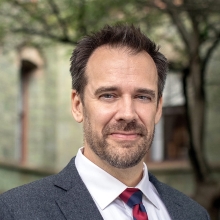Rare Earth Elements Project Wins Royal Society of Chemistry Education Prize

Three scientists from Penn Arts & Sciences are members of a team that won the prestigious Royal Society of Chemistry Horizon Prize for Education. Eric J. Schelter, Hirschmann-Makineni Professor of Chemistry; Marta Guron, managing director of the Center for Sustainable Separation of Metals in the Department of Chemistry; and Ranadeb Ball, a doctoral candidate in chemistry, are part of the Rare Earth Elements Project, created to engage and educate diverse audiences about these critical metals and the impact of current production methods.
Based at the Science History Institute, the Rare Earth Elements Project brings together scientists, historians, and artists to produce materials with objective, accurate information for various audiences. Combining historical perspective with contemporary scientific research, the project explains the context behind headlines about the 17 rare earth elements and their value for current and future technology. It includes museum exhibits, podcast episodes, articles for magazines and news sites, and a high school curriculum module where students learn about science and society by role-playing groups interested in the international rare earth trade.
“The energy transition, shifting to renewable, will touch all aspects of human life,” said Schelter. “It's great to help uncover and help others understand the many facets of this shift, namely as they pertain to obtaining energy-critical materials.”
Helen Pain, Chief Executive of the Royal Society of Chemistry, said, “The Rare Earth Elements Project’s work demonstrates an outstanding commitment to chemistry education, and it is our honor to celebrate their considerable contribution.”
The Royal Society of Chemistry is an international organization connecting chemical scientists with each other, with other scientists, and with society as a whole. Founded in 1841 and based in London, it has an international membership of over 50,000. The Excellence in Education Prizes celebrate inspirational, innovative,, and dedicated people working in primary, secondary, further education and higher.
To read more about the project and the prize, visit: https://www.rsc.org/prizes-funding/prizes/2023-winners/the-rare-earth-e…
To see the Rare Earth Elements Project, visit: https://www.sciencehistory.org/about/projects-initiatives/rare-earths-p…
Photo: Eric J. Schelter, Hirschmann-Makineni Professor of Chemistry





